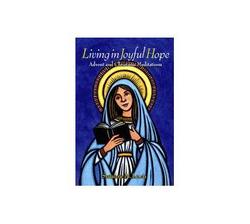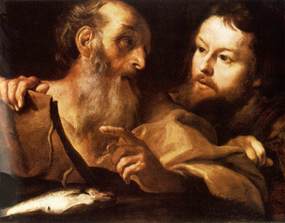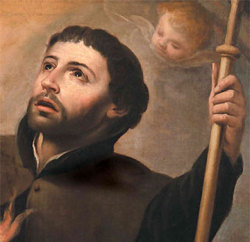 O God, who through the preaching of Saint Francis
O God, who through the preaching of Saint Francis
Xavier won many peoples to yourself, grant that the hearts of the faithful may
burn with the same zeal for the faith and that Holy Church may everywhere
rejoice in an abundance of offspring.
It was love…
This article by Rebecca Hoeffner about the ordination to the episcopacy of Joseph Strickland for service as the bishop of the Diocese of Tyler, Texas, is a terrific testimony to grace at work. The whole article is worth reading for the last sentence. The whole of the ecclesiology is summed up in that one sentence, with that one word… You can follow Bishop Strickland on his blog, FatherRunFather. Blessings on Bishop Joseph Strickland.
Prophet Habakkuk
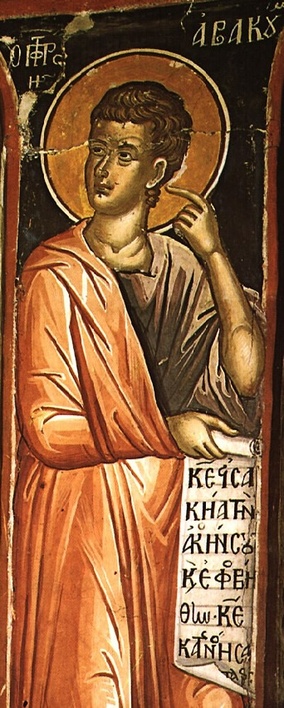 The Byzantine liturgical calendar includes the prophets in its commemorations because they foretell the coming of the Messiah, as the Kontakion states for today. (The Latin Church has the prophets in the Martyrology but does often feasts.) As a liturgical note, kontakion is a poetic text tied to the celebration at hand, or of a particular saint recalled during the Liturgy, most often sung by the deacon or some designated person following the proclamation of the gospel.
The Byzantine liturgical calendar includes the prophets in its commemorations because they foretell the coming of the Messiah, as the Kontakion states for today. (The Latin Church has the prophets in the Martyrology but does often feasts.) As a liturgical note, kontakion is a poetic text tied to the celebration at hand, or of a particular saint recalled during the Liturgy, most often sung by the deacon or some designated person following the proclamation of the gospel.
the world the coming forth of God from the south, from the Virgin. Standing on
the divine watch, you received a report from the radiant angel: “You proclaimed
the Resurrection of Christ to the world!” Therefore in gladness we cry out to
you: “Rejoice, splendid adornment of the prophets!”
Advent’s First Sunday
At the Sunday Angelus today, the Holy Father notes some crucial points about our Christian faith that can’t go unheard and need to be savored deeply in the heart. Notice, please, that Benedict doesn’t talk about expectation but he does speak of the Lord’s coming and presence; his death and resurrection and our final destiny (that is, love) and doesn’t mention the Christ Child as the exclusive image of Advent. The Cross, resurrection and ascension is our only Hope. Pope Benedict addressed the faithful with the following:
Today the Church begins a new liturgical year, a path that is further enriched by the Year of Faith, 50 years since the opening of the Second Vatican Council. The first Time of this journey is Advent, composed, in the Roman Rite, of the four weeks that precede the Birth of the Lord, that is, the mystery of the Incarnation. The word “Advent” means “coming” or “presence.” In the ancient world, it signified the coming of the king or the emperor into one of the provinces; in the language of Christians, it referred to the coming of God, to His presence in the world; a mystery that involves the whole of the cosmos and of history, but that recognises two culminating moments: the first and the second coming of Jesus Christ. The first is the Incarnation itself; the second is the glorious return at the end of time. These two moments, chronologically distant – and it is not given to us to know how far apart they are – touch us deeply, because by His death and resurrection Jesus has already accomplished that transformation of humanity and of the cosmos that is the final goal of creation. But before that end, it is necessary that the Gospel be proclaimed to all nations, as Jesus says in the Gospel of Saint Mark. The coming of Christ is continuous; the world must be infused by His presence. This permanent coming of the Lord in the proclamation of the Gospel requires our continual collaboration; and the Church, which is like the Betrothed, the promised Bride of the crucified and risen Lamb of God (cfr. Rev. 21,9), in communion with her Lord collaborates in this coming of the Lord, in which His glorious return is already begun.
It is to this that the Word of God recalls us today, tracing out a line of conduct to pursue in order to be ready for the coming of the Lord. In the Gospel of Luke, Jesus says to the disciples: “Beware that your hearts do not become drowsy from carousing and drunkenness and the anxieties of daily life . . . Be vigilant at all times and pray.” So: simplicity and prayer. And the apostle Paul adds the invitation to “increase and abound in love” among ourselves and towards everyone, to strengthen our hearts and to be blameless in holiness (cfr. 1 Thess 3, 12-13). In the midst of the turmoil of the world, or the desert of indifference and materialism, Christians accept the salvation of God and witness to it by a different way of life, as a city set on a hill. “In those days,” the prophet Jeremiah proclaims, “Jerusalem shall dwell safely; this is the name they shall call her: ‘The Lord our justice'” (Jer 33,16). The community of believers is a sign of the love of God, of His justice that is already present and working in history, but not yet fully realised, and that therefore should always be awaited, invoked, and sought after with patience and courage.
The Virgin Mary perfectly embodies the spirit of Advent, which consists of listening to God, a profound desire to do His will, and joyful service to others. Let us be guided by her, so that God who is coming may not find us closed or distracted, but might extend to each of us a small part of His kingdom of love, of justice, and of peace.
Blessed Charles Eugene de Foucauld
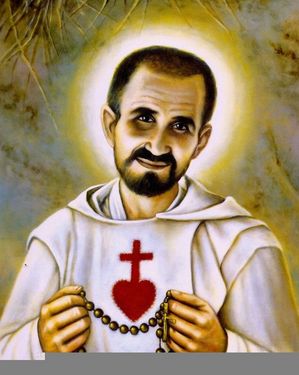 God our Father, you called Blessed Charles to live through your love in intimacy with your Son, Jesus of Nazareth. Grant that we may find in the Gospel the foundation of a more and more luminous Christian life and in the Eucharist, the source of universal kinship.
God our Father, you called Blessed Charles to live through your love in intimacy with your Son, Jesus of Nazareth. Grant that we may find in the Gospel the foundation of a more and more luminous Christian life and in the Eucharist, the source of universal kinship.
Chaput says Catholic life needs to be reignited; American culture is a new kind of mission territory
Philadelphia archbishop and Capuchin friar Charles J. Chaput writes well about the sobering reality of evangelization in his weekly column for this week. (Get in the habit of reading the Archbishop’s weekly essay.) The content of His Excellency’s essay “The new communities and the ‘New Evangelization‘” has “three simple things today: first, I’ll share some observations on the general state of the Church; second, I’ll talk about the role of new communities and charisms like the Sodalitium in the new evangelization; and third, I’ll offer some thoughts to this group as a brother in consecrated life, based on my own experience as a Capuchin and a bishop. I have a fourth point to mention as well; but it’s really more of a story. I’ll come back to it at the end of my remarks.”
Among the remarks of the archbishop’s are those he talks about the new communities, sometimes called the ecclesial communities. Each group has it’s own gift to give to the life of the Church. Each community answers a need and helps a person to be faithful to the Gospel in a new, vital way: a manner of really living the Good News and recognizing the grace of God right now.
Real Christian discipleship rejects and resists the kind of radical personal license and acquisitiveness that animates a consumerist society. So when the Catholic Church teaches about the dignity of the unborn child, the purpose of human sexuality, economic and immigration justice, the rights of religious communities and believers, and the
nature of marriage and the family – she’s not just “unpopular.” She’s hated as the enemy of individual privacy and personal freedom. And that theme shapes the way the Church is treated in the mass media.
For Catholics in my country to recover their vocation as a Church, they need to be awakened; they need a reason to be zealous again about their faith. They need to hear the witness of people like yourselves who live the Catholic faith with confidence and joy. They need to see their Church growing and fruitful, and young again, instead of constantly retreating and in decline.
This is the value of the new ecclesial communities and movements. They’re alive in Jesus Christ, and their new life and energy spill out into the whole Church.
For those of us who follow/live within the ambit of an ecclesial community whose founder is dead, what we compromise on? What will sacrifice to fit into the culture at large? Will we lose touch with the reasons that was the impulse of the founding of our community? Answer: may be; but I hope not.
Read the essay –it won’t take you long.
Our Lady, Star of the New Evangelization, pray for us.
Living in Joyful Hope
During Advent and Christmas we await and celebrate
the birth of Christ in order to tune our hearts to await and celebrate the
fulfillment of God’s “plan for the fullness of time, together up all things in
Christ, things in heaven and things on earth.” Ephesians 1:10. What better way
to tune our hearts than by listening, with great care and attention to the work
of God?
verses from the Bible with reflections and prayers to serve as a springboard
for our personal reflection on the Word of God. Suzanne’s mediations are based on the theology of the Catechesis of the Good Shepherd. Follow the link above.
Saint Andrew
Dicit Andreas Simoni fratri suo:
qui diciture Christus; et adduxit eum ad Iesum.
brother:
led him to Jesus.
Pope Benedict’s prayer intentions for December 2012
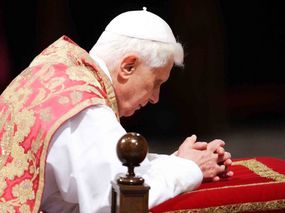 The December prayer intentions of the Pope have us praying for migrants and for the Light of the Incarnation to radiate from our own faces as witnesses to someone greater than ourselves. These are particularly poignant set of prayer intentions for us in the USA: we are a nation of immigrants; we are a City set on a hill. Our solidarity in prayer if not in other concrete ways ought to remind us of our roots.
The December prayer intentions of the Pope have us praying for migrants and for the Light of the Incarnation to radiate from our own faces as witnesses to someone greater than ourselves. These are particularly poignant set of prayer intentions for us in the USA: we are a nation of immigrants; we are a City set on a hill. Our solidarity in prayer if not in other concrete ways ought to remind us of our roots.The general intention
That migrants throughout the world may be welcomed
with generosity and authentic love, especially by Christian communities.
Christ may reveal himself to all humanity with the light that shines forth from
Bethlehem and is reflected in the face of his Church.
Speaking of God in 140 characters
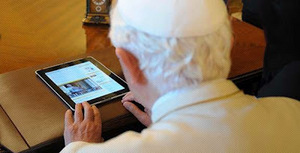 The Pope will tweet. Is this a mortal sin or a gospel value?
The Pope will tweet. Is this a mortal sin or a gospel value?
writes of Pope Benedict’s latest venture into tweeting. The Pope is not going to give up his love of books, old fashion research and handwriting his talks, but he’s diving into more deeply in the digital world. He’ll have to keep his message
to 140 characters. Can he do it? I am sure the clarity of the Pope can be
limited to a mere 140 characters. It’s ancient history now in cyberworld but it
was June 2011 that the Holy Father touched his own iPad launching the Vatican’s
News.va portal; tweeting in five languages
is a polymath way of communicating
at the Vatican.
Council for Social Communications since 2007, last week delivered his keynote address at
the 100th anniversary of Our Sunday Visitor. Celli has been hardworking in
moving the Holy See into the 21st century with an acceptance of social media and its benefits for communicating the gospel effectively today.


